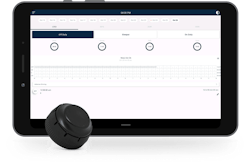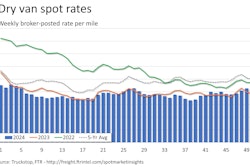After a small dust-up on LinkedIn, some news: Independent owner-operators with motor carrier authority looking to haul loads through J.B. Hunt's brokerage in the new year might have found a surprise in the onboarding process. Some have been asked to pay for a carrier vetting tool that demands some of the carrier's banking information get entered into a third-party portal.
Verified Carrier, the vetting service in question, has taken some heat before as its owner, Alex Panfilov, also ran a brokerage that included in its contract with carriers a clause asking the carrier to pay $300 to sign up and then $49/month for the service before the carrier could be paid.
Panfilov backed off of that clause in that case, saying he never actually went through with making carriers pay. He stepped down from his role at the brokerage, and admitted to a "mistake" in our talk with him about the subject. That was in the very early days of Verified Carrier, he said, and now, things have changed.
Panfilov says that some big brokers use Verified Carrier to clear carriers otherwise flagged by other "carrier vetting" services. Panfilov wouldn't comment on the relationship with J.B. Hunt, but gave a general rundown of how big brokers are using the service.

"We do not do onboarding for brokerages or tell them who to use or who to shut off," said Panfilov. "Where we step in with a lot of these enterprise accounts [with big brokers] is when a carrier is shut off by someone else, when another platform flagged them" as suspicious or fraudulent.
Past reporting chronicled how brokers' current "carrier vetting" craze can throw the baby out with the bathwater. Tools like Carrier Assure use an algorithm to vet all carriers, assigning them grades based in part on elements outside a carrier's control, like the number of roadside inspections they've incurred, or something as arbitrary as the carrier's time in business with authority.
[Related: Brokers' new 'carrier vetting' craze bad for trucking, carriers say]
Overdrive polling last year found 64% of readers don't see positives in this carrier vetting trend, saying it's bad for trucking. Over the last few years, truckers have been asked to jump through an increasingly complex system of hoops just for a chance to book a load with a broker. These days, taking a picture of your face, driver's license and other important documents next to your truck has become the norm with some.
In short, the very carrier vetting systems used by brokers to filter out fraudulent carriers have themselves become a noisy signal.
Verified Carrier's Panfilov doesn't argue with the notion that it's a little crazy to ask a carrier to pay $10/month to vet itself for a broker's approval, but with all the insanity swarming around carrier vetting and reviews, is $10/month an insane price to make it all go away?
When a big broker asks a carrier to sign up for Verified Carrier, "that means they already got flagged by an onboarding platform or the broker themselves," said Panfilov. "We don’t actually kick carriers out of a brokerage. They go through our system to get re-verified as a legitimate carrier."
Verified Carrier's eight-step vetting system, detailed previously here, starts with verifying all the info a carrier has given to FMCSA -- emails, names, phone numbers. The system checks to make sure the carrier has appropriate insurance (if it claims 50 trucks, are 50 trucks insured?), then verifies vehicle information and scrubs it against a national VIN database. Then government-issued ID, business details like Secretary of State filings, EIN numbers.
As part of the process, Verified Carrier directs carriers to enter their banking login information into a third-party service called Plaid. One carrier Overdrive spoke to recoiled at the idea of entering the password to her bank account into a service at the direction of a broker, and it's probably wise to exercise caution. Yet Plaid is the real deal. This author has used Plaid to link his Bank of America account to his Paypal for online payments. No vendor is perfect, and perhaps one day Plaid will get hacked like any big company might, but it's an aboveboard service that doesn't retain user information. Neither does Verified Carrier, for that matter.
"We do not get any login info" from Plaid, said Panfilov. "When going through the Plaid portion, it takes you off our website and goes on theirs. When they log in, Plaid releases only banking details, like the address of the company, phone number and email. We don't see any transactions or have any power to make transactions."
Panfilov and the VC team seemed to know that asking for banking information was more than a little novel and potentially off-putting for carriers. (The first time this author used Plaid, he was a little freaked-out, too.) Why ask for banking information? Simply put, it might be the only way to really ensure carrier identity.
There are entire businesses built on buying up old MC numbers onboarded with big shippers and brokers to evade carrier vetting attempts. These businesses throw in extra money for the email and phone number associated with an MC number so they don't have to change that information in FMCSA's system -- something carrier vetting services could potentially flag. Sometimes, these services offer a carrier tens of thousands of dollars for all the documents and personal info it takes to convincingly impersonate them.
[Related: How much is your MC worth? Maybe as much as $30,000]
But would a carrier give a stranger access to their banking information, given that bank account is linked to a Social Security number, even if they wanted to pay for it?
Verified Carrier, by using banking information, hopes to end the MC number trade.
When J.B. Hunt or some other big broker directs a trucker to use Verified Carrier, according to Panfilov (J.B. Hunt did not respond to requests for comment), that means the carrier is actually getting a second chance.
"Statistically, about 30% of carriers that got flagged by other platforms turned out to be legitimate" after Verified Carrier's vetting, a company official said. "We've figured out things from [fleets] parking in the same lot or using the same building, same mailing address, to find that legit owner-operators have been shut off" for simple misunderstandings. For instance, they noted, a carrier was hit with a Carrier411 FreightGuard, and so another carrier using the same street address also got flagged.
But after Verified Carrier's vetting, Panfilov said, the brokers using the service "give the carrier an opportunity to work with the broker" despite the misunderstandings.
In that way, the $10/month fee for one-truck operations acts as the kind of "reputation management" service Carrier Defender and the rest of the cottage industry growing around vetting advertises, at least among Verified Carrier clients.
Overall, Panfilov said "tens of thousands" of carriers have completed the process. He stressed that he's worked "on the carrier side" previously as a dispatcher and hopes to bring a lot of added value to carrier clients.
The service does cost $10/month for one or two trucks, $20 for three to five trucks, $30 for five to 10 trucks, $50 for 11-50 trucks and then $100/month for anything more than 50 trucks.
"We do pull a full complete report on" each carrier, said Panfilov. "Every facial recognition scan we do have to pay for. Every Plaid interaction we pay for. Once the carrier gets verified, it probably takes us five or six months to make back roughly what we're paying."
[Related: FreightValidate helps owner-operators fire back at brokers' vetting craze]
Verified Carrier monitors the authority on an ongoing basis, watching for changes with Secretary of State filings and elsewhere. "The carrier gets a dashboard" which it can use to monitor activity on their authority, and even lock the MC number in their system if they're out of town. "If their info gets stolen or their email gets hacked, we send them a report in our system and help them lock the profile and get a new email, and reach out to all brokerages on all platforms. That's why it's a monthly fee."
Furthermore, Panfilov said he's working on a suite of perks included with the service. He hopes his big broker "enterprise" clients will soon send their load information to Verified Carrier clients five minutes before they hit the load board. Additionally, being verified, he said, can give a leg up on spot freight negotiations that often fall through.
"I think there is a lot of value proposition for the carrier becoming verified," he said. "If you talk to a carrier that has been hurt by double brokering, they'll actually understand."
Panfilov and his team are also working to add fuel discounts, factoring discounts, ELD discounts and insurance incentives in addition to a potential early look at loads.
If a carrier still isn't sold on the value proposition, Panfilov said there's a 30-day "free trial" period. "If they can cancel, they don’t get charged one cent," he said. Carriers that cancel will, however, lose verified status as the monitoring will end with the cancelation.
"We don’t want charge a carrier until carrier sees value in it themselves," said Panfilov, who admitted the process includes a "few additional hoops" to jump through. "We had a carrier call us two weeks ago, they were shut off" with a big broker due to a "FreightGuard from a double broker. The FreightGuard was removed after they paid the double broker, who was blackmailing them, but they were still shut off by that customer."
Thanks to Verified Carrier, Panfilov said the carrier "got re-verified and is working with that customer now."
Ultimately, the very existence of Verified Carrier as almost a "carrier re-vetting" system for big brokers speaks to how crazy the freight fraud situation has become. Carriers themselves will have to decide if the $10/month is just another hurdle or a fair price to pay to stop the vetting and flagging madness.











